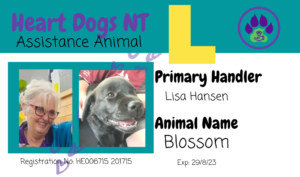PAWS Darwin Heart Dog Program
Aim: To provide assistance dogs in the NT for the NT
Who we are: PAWS Darwin is a not for profit, charitable organisation that has been working in the Northern Territory for more than 10 years. Our organisation cares for people and animals through a variety of programs and services that allow us to support Territorians. PAWS Darwin rehomes animals, trains animals and their owners, provides low cost veterinary care to those in need and supports the welfare of animals both Domestic and Wildlife.
Why Assistance Dog? Our team has long believed that animals help people to live better lives, whether that be by reducing stress or encouraging exercise or simply being there, animals help people. Daily we see people who benefit from spending time with our animals and we see these same animals fill the lives of people who adopt them. Now we want to take it a step further and take some of those extra special dogs to help some extra special people in the NT. Our qualified Trainers are passionate about the lives of people and their pets and want to help to bring regulation of service dogs to a local level.
What: Our dogs will be well socialised, able to pass the public access testing and most of all give their handlers the opportunities to live the same full life that everyday Territorians enjoy. Our dogs will be trained to support the needs of their handlers and to increase their handlers sense of security when they leave their homes. Whether the dog supports an individual with PTSD or autism or anxiety the dog will be trained to support the individual participate in every day life activities. Behaviour interruption techniques will be used to help reduce anxiety and other traumatic experienced faced by their handlers.
How can you help?
We are looking for venues who will accept our dogs in training and our service dogs as they learn to support their handlers. Without having access to everyday locations while in training the dogs will not be able to reach their full potential. Handlers will not fully be able to utilise their skills.
If you are able to support our Assistance dog training programs in anyway please let us know via email: heartdogs@pawsdarwin.org
PAWS Darwin works hard to make a difference in our community, any support you can offer will help us to help others. www.pawsdarwin.org.au
How will our trainers and dogs be identified?
The below patch will be on the dogs harness as an identification.
The handler/Dog team will have a handler ID card their details on the card and our registration numbers.
Want to find out more about sponsoring our Heart Dog program? We’d love to hear from you heartdogs@pawsdarwin.org
A Little bit about the Disability Discrimination act
What is the legal understanding of an assistance animal?
An assistance animal is a trained support designed to facilitate the participation of people with disability in accessing various aspects of personal and public life. They are sometimes mistaken as a pet but provide an essential function for some people with disability.
The Disability Discrimination Act 1992 (Cth) (DDA) in Section 9, sets out the legal definition of an assistance animal as a dog or other animal that:
(a) is accredited under a State or Territory law to assist a person with a disability to alleviate the effects of disability; or
(b) is accredited by an animal training organisation prescribed in the regulations; or
(c) is trained to assist a person with a disability to alleviate the effect of the disability and meets standards of hygiene and behaviour that are appropriate for an animal in a public place.
A recent Federal Court decision provides a good understanding about the law with respect to assistance animals and travel on aircraft. The judgment can be found here. A discussion of the key points of the case is below.
Specific issue of regulation / policy and various laws
The Australian Human Rights Commission recognises the work of the Victorian Disability Discrimination Legal Service (DDLS) in formally expressing to the Commission, its views on the current confusion around assistance animal legislation and policy in Australia.
The submission from the DDLS (accessible here) highlights apparent inconsistencies in laws and policies across the States and Territories, and between the States and Territories and the Commonwealth, which mean that people who use assistance animals face discrimination, uncertainty and a range of associated challenges to accessing the community.
The example provided in the DDLS submission describes the barriers that a woman from Western Australia encountered when accessing a public train while visiting Victoria. The DDLS states that she was asked to leave the train by Victorian police and issued an infringement notice despite having an assistance animal approved in Western Australia and it wearing appropriate certification. Such situations highlights potential barriers to travelling interstate for people using assistance animals.
Variation among states and territories regarding accreditation and regulation of assistance animals will continue to present a range of issues for people with disability who use assistance animals to access the community. Examples of the situation in each jurisdiction is set out below.
- Victoria – an Assistance Animal Pass is required and issued by Public Transport Victoria permitting assistance animals to travel on public transport. The pass is valid for 3 years.
- Western Australia – The Public Transport Authority doesn’t require permits for assistance animals to travel on public transport. There is local government legislation providing for animals to have an ID card and a dog coat/harness.
- Queensland – A Handler’s Identity Card is valid for 5 years allowing travel on public transport. Also, Translink (South East Queensland Transport Authority) issues an Animal Pass provided the dog meets certain standards of behaviour in public.
- South Australia – The Dog and Cat Management Board issues a Disability Dog Pass that is valid indefinitely.
- New South Wales – An Assistance Animal Permit is required for access to public transport, however Guide dogs and Hearing dogs do not require a permit. The permit must be renewed annually.
- Australian Capital Territory, Northern Territory and Tasmania – no system of accreditation exists and no specific passes issued.
In addition to the regulatory variation among states and territories, the existing law can create confusion as it provides permission for animals who have been certified or accredited to travel, in addition to those who have had appropriate training, but don’t have accreditation or certification. The determination of appropriate standards of ‘hygiene and behaviour’ is also an issue of confusion, as it is not specifically set out in the DDA.
The DDLS has called for a number of changes, recommending the following:
- A national model or interstate recognition of assistance animal identification and certification. They specifically suggest the States and Territories consider introducing a provision similar to the Western Australian provision (section 8(1) E of the Dog Act 1976 (WA)), recognizing the accreditation of an assistance animal from a different state or territory.
- One permit that can be used for a variety of legitimate purposes, so that a person could access public transport, employment, educational settings for example.
- The validity period and renewal of certification can impose burden on people with disability in terms of cost and inconvenience, if too regular. South Australia has an indefinite time period, which has been indicated as generous, alternatively the 5 year validity period in Queensland is also noted.
Ultimately with the implementation of the National Disability Insurance Scheme (NDIS) more people with disability can be expected to be exercising their right to access their communities and utilize appropriate supports, including assistance animals. The Assistive Technology Strategy of the NDIS includes a regulatory role for the Agency around spending provisions with regard to Guide Dogs. Without associated changes to address the current gaps in policy and regulation across the country with regard to assistance animals, continued barriers and discrimination will remain for people with disability who rely on these supports on a daily basis.
